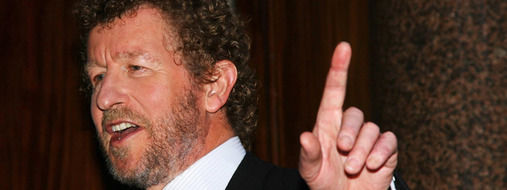From The Daily Express/U.K.
MUSLIM CLERIC: SEBASTIAN FAULKS SHOULD FACE SHARIA JUSTICE

Anjem Choudary
Thursday September 3,2009
By Ted Jeory for SundayExpress.co.uk
MUSLIM firebrand Anjem Choudary caused new outrage last night after demanding author Sebastian Faulks be tried before an Islamic court where the penalty could be possible execution.
He said the bestselling novelist should be hauled before a Sharia court to answer charges that he had insulted the Prophet Mohammed by describing the Koran as the “rantings of a schizophrenic”.
In the interview last week, Mr Faulks added that the English translation of the Koran was a “depressing read”.
Although the bestselling author has since apologised, Islam4UK a radical group associated with Choudary and his mentor, the banned cleric Omar Bakri Mohammed, posted an article on its website entitled, “Sebastian Faulks on a Death Wish?”
The article goes on to say that “with other individuals having faced disturbing consequences over the last few years for similar rants, [Mr Faulks] cannot provide himself an excuse for not being aware of the repercussions of such careless comments, which is a great cause for concern”.
 |
| Author Sebastian Faulks |
It concludes: “May Allah punish the oppressors and deal with the slanderers.”
Mr Choudary, a former supporter of banned extremist group Al-Muhajiroun, denied writing the article, but said he agreed with its content.
The father of three, who sits as a judge in the London Sharia court and wants the “flag of Allah” flying over Downing Street, went further.
He said the murder of Dutch film director Theo van Gogh, who was killed by a Muslim extremist in 2004 after criticising Islam, should serve as a warning.
“Mr Faulks was extremely naïve for what he said and it could have some grave consequence for him,” he said.
“He’s not the first person to insult the Prophet. You can see with Theo van Gogh and Salman Rushdie and whole host of other people that it does have those consequences.
“There are many people out there who do like to take things into their own hands.
“Someone like this needs to be assessed in an Islamic court of law and if he’s found guilty then there would be capital punishment.
“It would have to be assessed by an Islamic judge, but that could only happen in an Islamic state where the Sharia is implemented.
“The Sharia court that I does not deal with things like this though. We don’t have anywhere in the world that would deal with anywhere like this yet.
“Just as we chopping the hand off a thief and stoning the adulterer, we have for the one who insults the Prophet the death penalty.”
Last night, Alexander Meleagrou-Hitchens, of the Centre for Social Cohesion, said: “Choudary and his followers are seeking to impose their will on the population of this country through subversion and incitement to violence.
“Their latest veiled threats to Sebasitan Faulks serve to provide us with yet another example of the extremist threat posed by this organisation.
“The weakness of Choudary’s fascist ideology could not be better illustrated than by his inability to provide an intellectual response to criticism, instead resorting to veiled threats and intimidation.”
However, Birdsong author Mr Faulks declined to comment. His spokeswoman said: “He apologises if his comments about the Koran have offended Muslims.”
Following the controversy surrounding his remarks, the writer, who researched the Koran for his new novel A Week in December, said: “I feel sad about this, because my new novel is carefully researched, and, among its main characters, presents a hugely sympathetic and loving Muslim family; it is furthermore made clear that the parents’ kindness and good citizenship spring not just from being naturally good eggs but from their devotion to the Koran.”
He added: “When, with some excitement, I first read the Koran last year as research for my novel, I confess that I was disappointed by it.
“Raised as a child on the exciting stories of the Old Testament and inspired by the revolutionary teachings of the New, I had, perhaps naively, expected something comparable.
“The Koran has lovely passages, some of which inspire my character Farooq in the novel, but I did find it, from a literary point of view, repetitive.”
